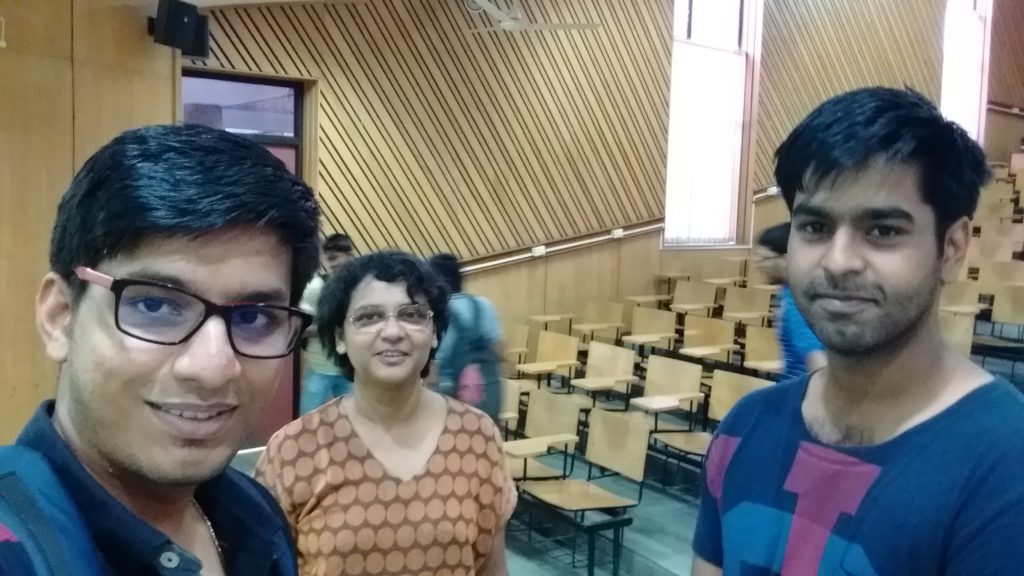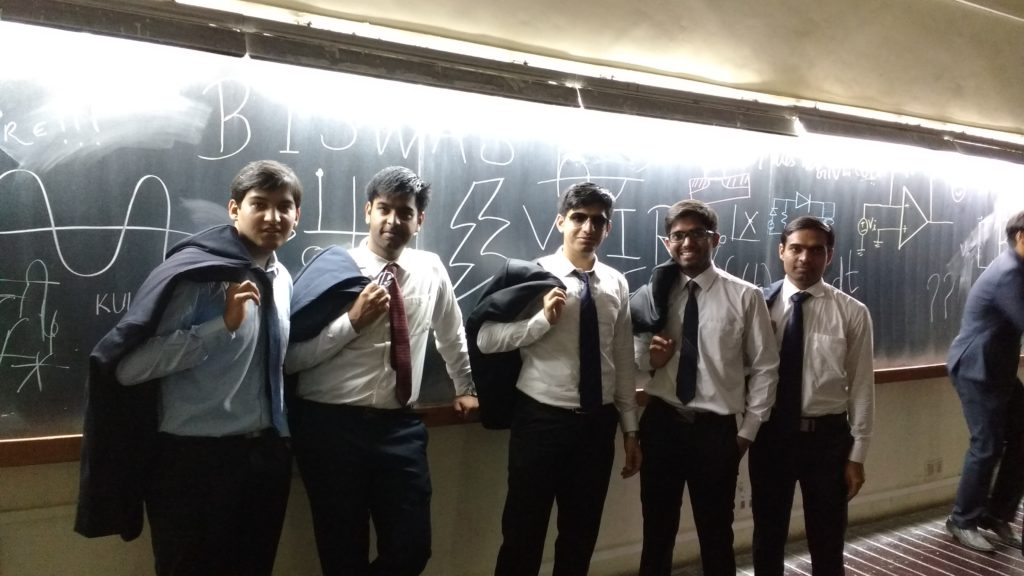Disclaimer: The views conveyed in the article are solely of the author, and do not necessarily reflect the views of Vox Populi or any of its members.
My name is Sourya Basu, and I graduated from the Department of Electrical Engineering, IIT Kanpur in the year 2017. I got placed in J.P. Morgan last year where I worked for a couple of months, post which I worked as a Junior Research Fellow (JRF) at IIT Kanpur till April 2018 and now will join the Department of Electrical and Computer Engineering, University of Illinois at Urbana-Champaign for my graduate studies this year in the fall.
My time at IIT Kanpur, both during my undergraduate studies and my time as a JRF, has definitely been the best time of my life so far, and I would trade anything just to get to relive these years one more time.
My first night at IITK was probably the toughest. Given my introvert nature, it was usually difficult for me to interact with strangers easily, and when I got here, watching hundreds of unfamiliar faces around me freaked me out, and the ‘interaction sessions’ with seniors just made things worse. However, it was soon after that my roommate, Angad, ‘discovered’ me and I was a part of all sorts of groups which he was a part of, and I started enjoying interacting with people like never before. Hadn’t it been for him I wouldn’t have known most of my friends and I just can’t imagine how dull and difficult it would have been for me to stay here, without those hangouts, the celebrations, the movies, the exam time preparations, and of course the tough times of semester results.
It was some time during these hangouts that I met a bunch of people with whom I formed a team, named Technofreax, which would participate in all sorts of technical competitions and was meant just for fun as well as for exploring different possibilities (and yes money too, from awards mostly, since money usually gets translated to fun). This was the phase when we would look for every opportunity to participate in technical competitions and run for prizes and awards. Our pursuit for the same made us participate in the Ericsson Innovation Awards where our project was selected in the top 10 projects among all the IITs. It was a huge success for us.
Soon, we’d started discovering our different interests, some wished to pursue entrepreneurship, some were preparing to enter the corporate world, while others like me were more into research.
For exploring more about research at IITK, I started working on topics in data compression in the summers of my second year. Although the work done during this period was elementary, it helped me get an internship at the University of Illinois at Urbana-Champaign the next year during the summer break. This internship helped me get a lot of exposure to the research done in the area and, I got excited to work on it further in the coming years. Although I was motivated to go for a PhD right after my undergraduate studies, a number of reasons made me change my mind.
While in the US, I missed India a lot, the people, the culture. I felt somewhat lonely there and the thought of spending such a long time there, away from friends and family, worried me. The topic of my research being way too theoretical and mathematical further exacerbated my worries (although I love mathematics, I am not too good at it). I thought maybe a job in India with enough mathematics or coding requirements might interest me and I will also be able to stay close to my friends and family and hence I decided to change my plans and joined the industry. Hence I thought that maybe joining the job industry was the way ahead for me, but as life would have it nothing goes as per your plan.


What I observed was that the industry jobs right after undergraduate degrees were more business oriented rather than innovation-oriented, which means that one might have to do relatively dull work if it meant making money for the company. I remember the very first day I was assigned work (it was day 4 of my job probably) for the next few months, I had called back home and said that I have had enough and that I wanted to quit that job (the work was challenging but to me it was plain dull coding). Making such hasty decisions is never a good idea, and hence I decided to give it a second thought.
Unfortunately, soon I got allergic to the kind of the work done in the industry in general (several of my friends enjoy it and I am not discouraging anyone from joining the industry, it depends on what you are looking for in a job), and hence I couldn’t switch to any other company. At this stage, I was at my all time low – I had a lot of hopes for the job when I was placed, I had quit my plan for a Ph.D. and an unofficial offer and I didn’t have anything to do for another year. I was almost sure that I had to quit that job to get out of the phase of depression I was going through.
This is when I wrote about my situation to Prof. Rajesh Hegde at IITK, with whom I had worked earlier, asking about any available research position in his lab. He promptly replied saying that he would be happy to have me in his lab and that he had a project that might interest me. I was really happy that IITK had my back, and provided me with just the right opportunity that I required even after I had left. In about a week’s time, I had quit my job and later returned back to the campus where I was glad to be reunited with my dual-degree friends.
After getting back there, I picked up my partially done work on compression and started making good progress. Things started to get better and eventually I started getting good Ph.D. offers from several universities. This incident taught me a lot about life. Firstly, if you love to do something, it is sometimes better to suppress your fear, for fear is temporary, and life goes on for a long time. Secondly, when you feel trapped in the middle of nowhere, know that there are always some people who want to help you out; you just need to reach out to them.
As for advice to juniors, I have a few important ones that I wish I knew when I started. To start with, it is important to realise that you have earned a seat in one the most prestigious institutes in the country and you wouldn’t want to waste your time here getting addicted to games, or TV series. Try to find the right balance, and avoid addiction (of any sort). Secondly, one major confusion among students in their first year is the notion that PORs earn you a high paying job. I would recommend getting a POR if and only if you like to be a part of the work involved and not just to get a job, because if you just want a job, then more projects and coding skills in your resume will definitely help you better (this is probably the harsh truth most of us realise latest by the internship session, though it’s not too late even then).
As for your time at IITK, I believe that there needs to be more interaction between the undergrads and the professors, not necessarily the informal ones, but through projects. There are so many interesting projects going on in most of the departments that one should try to make full use of the freedom that we have and explore the work in different departments. It’s not necessary that all of the projects would result in good research or technical work, but there is no harm in exploring as long as you maintain a good balance of exploration vs exploitation. Doing such projects would not only help you gain technical knowledge and coding skills, but you will also have better idea of what you want to do after graduation.
Further, regarding internships I would suggest that one should try to do at least one industrial as well as research internships (preferably one from a lab outside IITK because one can anyway have exposure to IITK labs during their semester period). In my case, I wouldn’t have joined the industry at all if I had some prior experience through internships and would have saved a year.


I feel that the interaction among students of different years can be made slightly better. I got to know seniors of my department seniors sometime late in my second year, probably because the ‘interaction sessions’ didn’t really serve its purpose. However, it is also interesting to note that I have seen more such interactions amongst students of different years during the later stage of their stay. So what exactly goes wrong in the first year? Perhaps this is something we need to discuss more.
As I prepare for my graduate studies and revise some of my undergraduate courses, I would like to reiterate that these have been the best years of my life and I wouldn’t trade them for a million dollars.
Edited by Naman Verma










































